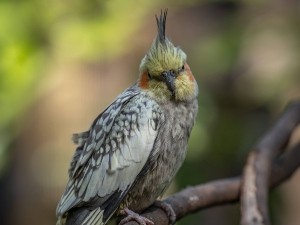
Cockatiels are known for their pretty feathers, these birds can have a range of different colored feathers, but if the color of your cockatiel’s feathers start to change you’d be right to be alarmed
This article looks into why your cockatiels feathers may be turning black.
Table of Contents
Cockatiel feathers turning black:
Any change in your bird’s appearance should be concerning to you, the appearance of your cockatiel can tell you a lot about the health of your bird and your cockatiel’s feathers turning black can mean a number of things including:
Stalled molting:
Molting is one harmless reason why your bird’s feathers are starting to look black.
Your bird’s feathers will look old and dull by the time they’re meant to molt.
If the feathers stall when the time to molt comes around then the feathers will start to turn brown or even black at the tips.
Molting is quite taxing on your bird’s body and if the bird isn’t eating enough nutrients in order for molting to begin then the molting may be stalled and the already old and dull-looking feathers will start to look quite bad turning brown or black
The new feathers may also grow out as brown or black if your cockatiel isn’t eating well enough during the feather regrowth stage.
What to do:
If there was ever a time for your bird’s diet to be optimized it is during the molting stage. Make sure that your cockatiel is eating nutrient-rich foods during this time to help the process along.
Giving your bird additional nutrients in the form of more food or supplements during this time is recommended.
Diet issues:
Another reason why your cockatiel’s feathers may be turning black may be because there is something wrong with the bird’s diet.
The issue may be an excess of fat in the bird’s body, an excess of protein in the bird’s body, or, a lack of vitamin A in the bird’s body.
In the wild, cockatiels usually eat fruits as foods with fats and protein are hard to come by, but your bird will still crave fats and protein.
So, in domesticated settings, your cockatiel will overeat foods rich in fats and protein causing their feathers to turn black.
What to do:
While cockatiels need fat and protein how much of it they eat should not be up to them.
When feeding your birds fats and proteins you’d need to give them a measured amount of each, only enough to fulfill their needs and not more.
Supplementing vitamin A in the form of supplements or foods will increase the vitamin A levels in your cockatiel’s body.
Fungus:
Another reason why your bird’s feathers may be turning back is that your bird has a fungal infection.
If your cockatiel develops a fungal infection then you may notice black streaks developing on the bird’s wings and these black streaks may also develop on the bird’s beak as well.
Not only will the fungal infection cause your bird to develop black streaks on its wings and beak, but other health issues can also develop.
Depending on what fungal infection your cockatiel has, the infections can be life-threatening to your bird.
What to do:
If your bird does develop these streaks on its wings then you’ll have to wait until the bird molts the old feathers and a set of new feathers grow in, this is the only way your bird’s feathers will go back to normal.
It is however recommended that you take your cockatiel to the vet, the vet will examine the bird and prescribe antifungal medications for the bird if it is found that your bird does have a fungal infection.
Fungus grows in unclean environments where there isn’t good ventilation.
Keep the chances of your bird developing a fungal infection at a minimum by keeping your bird’s environment clean and sanitized.
Also, make sure that the bird has access to good clean fresh air through good ventilation in its room.
If you enjoyed this article then you may also be interested in other bird related articles. Here are some articles that you may be interested in: Conure Poop Watery, Why Is My Conure So Clingy?, Why Are Cockatoos So Loud?, Parrot Stomach Infection, How To Clean Cockatiel Tail Feathers, No Urates In Bird Poop, Conure Closing One Eye

